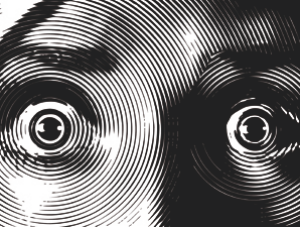
Author Lint Hatcher says that some people have ‘The Spooky Gene’. For whatever reason they’re fascinated with the creepier side of life. Maybe it’s scary movies, the paranormal or gritty crime fiction. You’ll see it at the Tower of London when the crowd perks up just as the guide gets to the grisly bits.
As a Baptist minister it’s fascinating spotting who has this gene and who doesn’t. Like the kindly, flower-arranging pensioner who leans in closer during a reading of the tent peg scene in Judges.
Or the mum in the Parent and Toddler group whose eyes glaze over when I talk about church but who sparkles if someone mentions a haunted house.
And then there’s me, who has a long-term case of the spooky gene: a love of horror films (which, incidentally, doesn’t always mean gory or violent) and a fascination with the paranormal. When I became a Christian I was told to bury such freaky interests - which I did - until my Master’s Thesis on Religion in Horror got me wondering: what if God might be found in the really unexpected places.
So I took a leave of absence from the pastorate. And while I still preach lots of non-horror sermons in various churches, I now have time to explore where the scary and the sacred meet. I write a monthly column for the secular print magazine
The Fortean Times. I present a horror theology podcast called
The Flicks That Church Forgot. I’ve written a scary, theological thriller novel which my agent is currently pitching.
And I receive regular emails from the thousands of often unchurched people who read or listen to my reviews worldwide. Sometimes when I attend horror press screenings in London, fellow critics spit out their drink when they spot the word Rev on my twitter handle. But then they ask for my email address. ‘What do you believe, then?’
It’s controversial of course. I get that. To those without the spooky gene it’s nonsensical, dangerous even. Better to watch
Toy Story 3. Good for them. But what about the millions who are drawn to this stuff, some of whom are in your church, attending your Alpha courses? Do we write them off, tell them to change their personalities? Especially when horror is one of the few genres to take the supernatural and objective evil seriously?
Case in point:
The Exorcist (1974). William Friedkin’s box office phenomenon terrified audiences and repulsed many Christians, who struggled to find any merit in watching a tale of a young girl possessed by the devil. Being a little too young to have caught it in cinema (I was six months old) I eventually tracked down a copy in the late 80s. As an unchurched teenager I remember feeling something like a spiritual charge slipping the tape in and bracing myself.
Because it wasn’t the gore or spectacle that was making my heart race, but the unashamed presentation of a life changing idea: that maybe there really is such a thing as objective good and evil. Yes there was blasphemy (hardly surprising given the subject) but it was one of the few films I can think of where the priests were the heroes. In this, the devil wasn’t some enticing, figure of liberation but a horrifying hate-filled juggernaut. Some might call it an evil film, but all I can say is that I’ve met several Christians whose spiritual journeys began with it.
Some of you reading this will be shaking your head. Yet, others wonder if God’s fingerprints might be found in the unexpected areas of culture. Where wider really means wider. Beyond the reaches of what we previously thought. I’m not evangelical about horror. If you don’t have the spooky gene, then avoid it. It’ll only creep you out; give you nightmares.
But those who do have it are often like I was: searching for spiritual answers in a disenchanted world that insists there is nothing beyond the physical. Bizarrely horror movies said something different and I think growing up, they set me on the path to God.
These days I’m discovering what I always suspected: I’m not the only one.
Photo: istockphoto.com